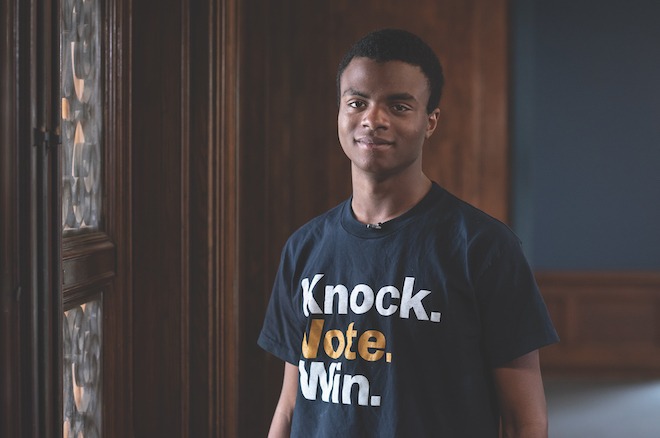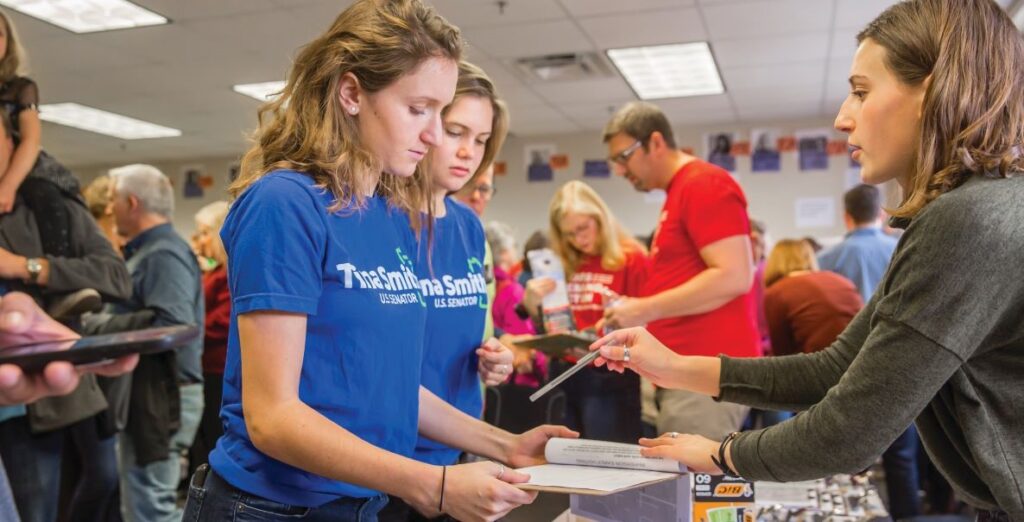Since 2008, Occidental College, a distinguished liberal arts institution in Los Angeles, has encouraged undergraduates to become politically engaged. Every two years, all students, unrestricted by major or year of study, can elect to join the “Campaign Semester.”
During the 2024 fall semester of this crucial election year, students will have the opportunity to remain enrolled at Occidental, earn full-time academic credit (16 units), while they spend 10 weeks volunteering in any party’s presidential, Senate, House or gubernatorial campaign. The selected race must be in a swing or battleground district, where the outcome is likely to be close. Students who volunteer away from school may be eligible for housing and travel support.
In addition to learning about American politics, students may choose to expand their knowledge in other areas: using language skills in Spanish, Chinese or other languages; connecting historical context to neighborhood experience; and understanding the special math of statistics and campaign financing. Every student learns to improve communication in essential ways: careful listening and respectful conversation with people who come from different backgrounds and hold opposing opinions.

During two-and-a-half months of fieldwork, students work on the campaign for a minimum of 40 hours per week, keep a daily log of activities, and maintain an internship journal to be handed in at the end of the semester. They must email their supervising faculty members at least once a week to share experiences and reflections. A campaign staff member serves as their supervisor in the field.
After Election Day, students return to school to participate in a five-week on-campus seminar encompassing two courses:
- Politics 270-Seminar on Political Campaigns, examining the role of money, media, candidates, interest groups, leadership, gender, race, and political parties
- Politics 272, Independent Study: Political Campaign Analysis, resulting in a 25-page research paper, incorporating extensive secondary data and original analysis, addressing a major question in American politics.
So far, more than 125 students have participated in Occidental’s Campaign Semester, including Anya Silverman-Stoloff, who later wrote about her experience doing outreach for a Texas congressional candidate, Gina Ortiz Jones, in 2018. Silverman-Stoloff says she spent several weeks feeling out of her depth, driving around the Texas district, often on her own, to meet potential voters. But the experience also taught her “to understand the inner workings of America.”
“I talked to thousands and thousands of people, and in the end, I learned that we have more in common than we have differences. I know it sounds cliché, but after this experience, it really feels true,” she writes. “Participating in Campaign Semester was the best decision I have ever made. I learned so much about this country, and so much about myself. I came out confident, independent, and well on my way to figuring out what I want to do in life. And I know I did everything in my power to make this country a better place.”
Now is the time to stop blaming young people for indifference and social media for insurmountable interference. As philosopher and reformer John Dewey (1859-1952) famously said, “Democracy has to be born anew every generation, and education is its midwife.”
Philadelphia universities and colleges should steal this idea
Occidental College has been implementing the Campaign Semester every other year for the last 16 years. And yet Occidental says that theirs is “the only program of its kind in the nation.” It’s time for other universities to move forward with similar programs. Already, many universities offer semester experiences in Washington, D.C., or internships with elected officials. As I have written before, these opportunities are extremely valuable.
But the Occidental Campaign Semester is something special. We are unfortunately in a time when election fairness is called into question as a result of conspiracy theories and abounding disinformation. It’s essential that young people participate first-hand in what Washington Post columnist E. J. Dionne, Jr., calls “shaping our democracy.” He goes on to say, “What’s fair is a critique of the education system for doing precious little to encourage young Americans to learn from the experience of political engagement — to discover the joys and struggles of organizing their fellow citizens, listening to them and trying to change their minds.”
Dionne interviewed Occidental student Sunari Weaver-Anderson, who worked in 2022 with the Unite Here union in Philadelphia. Sunari told Dionne, “… I learned that I was capable of talking to anyone, regardless of our backgrounds and political leanings.”
It might seem impossible to launch a Campaign Semester at Philadelphia colleges and universities in time for this crucial election season, which has already begun. A full-scale systemic opportunity would necessarily have to be planned for 2026, or even better, for the local elections in 2025. All politics are local after all, and a local emphasis would do Occidental one better.
But any faculty member reading this article knows that it is possible under the Independent Study rubric to launch something immediately on a smaller scale. E-mail Professor Peter Dreier, the Occidental professor who created the program, or Professor Regina Freer, who works with Dreier to supervise students’ independent study projects and runs the post-election seminar. It’s clear that these colleagues have a sense of mission and would be helpful. Imagine the benefit to students, the city and the country if this fall every Philadelphia college and university offered a Campaign Semester Independent Study for full academic credit.
Now is the time to stop blaming young people for indifference and social media for insurmountable interference. As philosopher and reformer John Dewey (1859-1952) famously said, “Democracy has to be born anew every generation, and education is its midwife.”
The combination of experience, study, and reflection offered by Occidental’s Campaign Semester is essential to democracy’s rejuvenation. Let’s do it here right away.
Elaine Maimon, Ph.D., is an Advisor at the American Council on Education. She is the author of Leading Academic Change: Vision, Strategy, Transformation. Her long career in higher education has encompassed top executive positions at public universities as well as distinction as a scholar in rhetoric/composition. Her co-authored book, Writing In The Arts and Sciences, has been designated as a landmark text. She is a Distinguished Fellow of the Association for Writing Across the Curriculum. Follow @epmaimon on X.

